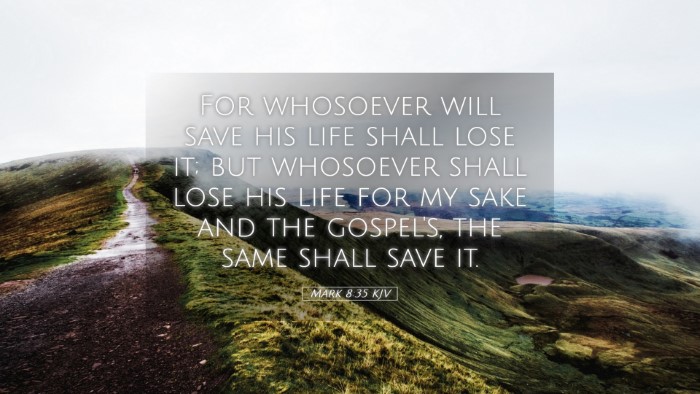Bible Commentary on Mark 8:35
Verse: "For whoever wants to save their life will lose it, but whoever loses their life for me and for the gospel will save it." (Mark 8:35, NIV)
Introduction
This poignant teaching from Jesus encapsulates the paradox of the Christian life and sets the tone for followers of Christ. In a world often driven by self-preservation and personal gain, this verse challenges deep-seated notions about the true essence of life, discipleship, and the Kingdom of God.
Exegesis and Analysis
Understanding the Context
The setting of Mark 8 involves Jesus revealing His identity and the nature of His mission. Right before this verse, Jesus foretells His suffering and death, calling attention to the radical demands of discipleship. Both Matthew Henry and Adam Clarke emphasize that the immediate context of this passage underscores the call to self-denial and sacrifice.
The Cost of Discipleship
Matthew Henry elaborates on the notion that true discipleship requires an abandonment of self-interest. "If we would follow Christ, we must deny ourselves, take up our cross, and embrace a life of sacrifice," he notes. This denial is not merely an external act but a heart posture towards God and others, reflecting the necessary humility and total surrender to the will of God.
The Paradox of Life and Death
In this verse, Jesus presents a profound paradox: the attempt to preserve one's life leads to a loss, whereas losing one's life for His sake promises true salvation. Albert Barnes explains that "the life referred to includes our selfish ambitions, desires, and the entire pursuit of a life centered on our own comforts." This challenges believers to re-evaluate their priorities and embrace a life that glorifies God above personal desires.
Illustrations of Sacrifice
- Historical Context: The early church illustrates this principle through the lives of martyrs who chose to give up their earthly lives for the sake of the Gospel. Their stories serve as a profound reminder of what it means to live sacrificially.
- Contemporary Application: Modern believers are likewise called to make sacrifices in various forms—be it time, resources, or emotional investment—demonstrating their commitment to Christ's mission.
The Kingdom Principle
Both Adam Clarke and Matthew Henry emphasize that losing one's life for Christ and the Gospel is not a loss in the Kingdom economy; rather, it is the gateway to eternal life and fulfillment. Clarke writes, "The promises of Christ are boundless; when we lose in this life for the sake of His cause, we gain immeasurable treasures in the life to come." This reinforces the theme of the eternal perspective that pervades the New Testament teachings.
Reward of Obedience
In discussing the rewards of obedience, Albert Barnes notes that "the sacrifices made in this life will yield an abundance of blessings in eternity." This motivates believers to persevere in their calling despite hardships, knowing that their labor in the Lord is not in vain (1 Corinthians 15:58).
Spiritual Implications for Believers
The implications of this verse extend beyond the immediate context; it serves as a guiding principle for spiritual growth and maturity. Believers are summoned to:
- Embrace Suffering: Understanding that suffering is a component of spiritual growth (Philippians 1:29).
- Seek After God’s Will: Prioritizing divine calling over personal ambition (Matthew 6:33).
- Mentor and Disciple Others: Demonstrating sacrificial love that points others to Christ (Matthew 28:19-20).
Conclusion
Mark 8:35 serves as a clarion call to believers to reassess their lives in light of eternity. The teachings of Matthew Henry, Albert Barnes, and Adam Clarke converge to illuminate the transformative power of surrendering our lives to Christ. In losing our lives for His sake, we truly find our purpose, fulfillment, and the rich rewards of the Kingdom of God.


